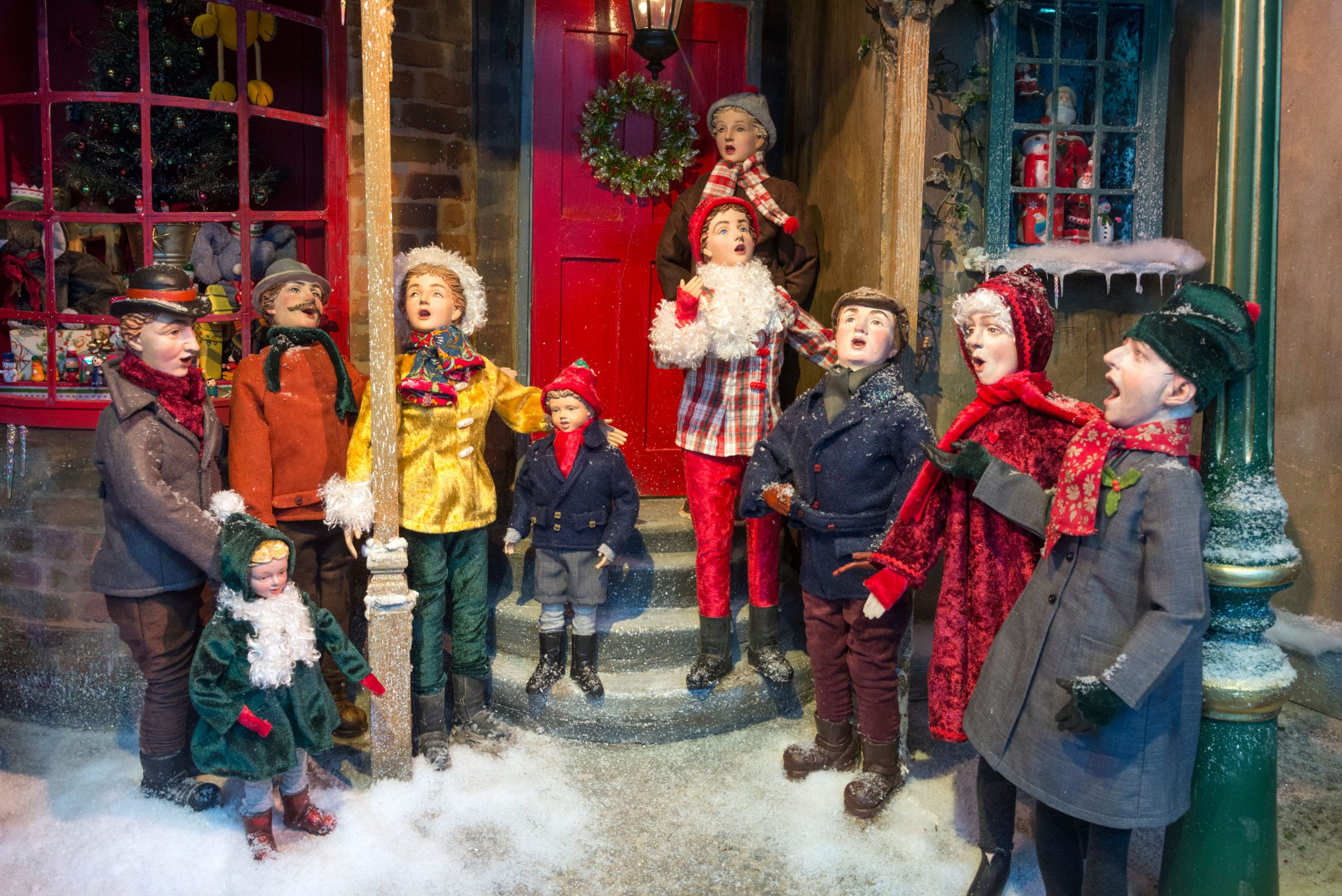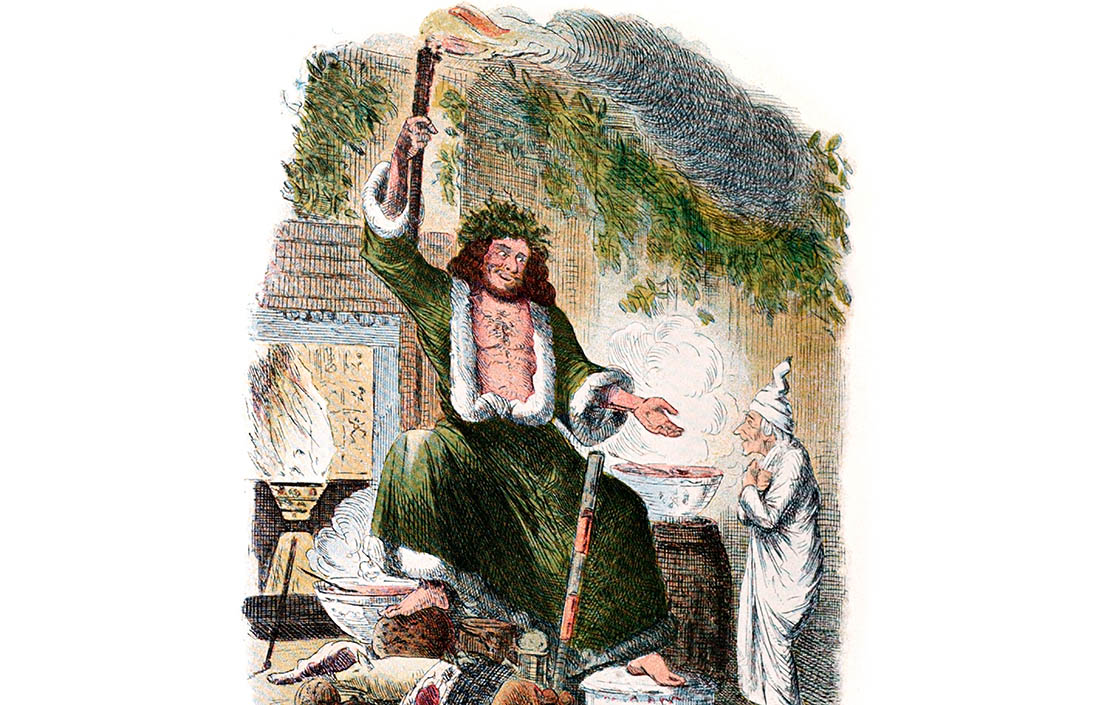Who wrote the Christmas Carols we know and love? 11 songs and their stories, from Silent Night to Good King Wenceslas
Many of our best-loved and most moving Christmas carols started life as poems in search of a tune. Andrew Green uncovers the writers whose works were nearly forgotten, yet are now imprinted on the memory.


They are the ghosts of Christmas past and present: the barely considered wordsmiths whose lines adorn the time-honoured favourite carols that coax even the most vocally timid of us into a wintry warble. Most of us, however, have a passing acquaintance with one story.
Silent Night
On Christmas Eve, 1818, an Austrian Catholic priest, Josef Mohr (1792–1848), took verses he’d penned to his friend Franz Gruber, hoping the schoolmaster-musician could conjure an accompanying tune for that evening’s Midnight Mass in the Alpine village of Oberndorf. Gruber could and Stille Nacht — Silent Night — duly made its debut, apparently with guitar accompaniment, given an ailing church organ.
O Little Town of Bethlehem
A host of lyricists are now shadowy characters at best, many of them clerics, many of them Americans. Take the Revd Phillips Brooks (1835–93), who came up with O Little Town of Bethlehem in 1868 when he was rector of the Church of the Holy Trinity in Philadelphia. Brooks found fame via his sermon at Harvard’s 1865 commemoration of American Civil War dead. Later that year, perhaps seeking solace after the conflict, he headed for the Holy Land.
‘In the course of his travels he visited Bethlehem,’ reports Cynthia Staples, historian at Trinity Church in Boston, where Brooks became a legendary preacher. ‘He may have been there on Christmas Eve, 1865. On his return, he wrote O Little Town of Bethlehem for his Sunday-school children.’
Brooks asked Holy Trinity’s organist, Lewis Redner, to set the words to music — and the ‘American’ version still has a completely different tune to the British version:
The one you’ll have heard on this side of the Atlantic came about thanks to Ralph Vaughan Williams, who used the English folk-song melody, The Ploughboy’s Dream for the same words. It’s a reminder that ‘Traditional’ and ‘Anon’ have made huge contributions to our Christmases in terms of both tunes and texts.
It Came Upon the Midnight Clear
A troubled global situation found its way into the words of It Came Upon the Midnight Clear, written by Edmund Sears (1810–76) at a time when the Massachusetts pastor seems to have been deeply disturbed by world events — including the 1848 revolutions in Europe and America’s war with Mexico. Hence, apparently, such lines as ‘the woes of sin and strife’ and ‘man, at war with man’. Richard Storrs Willis’s tune ‘Carol’ is usually used in the USA, as immortalised in Johnny Mathis’s beautiful 1958 recording.
Exquisite houses, the beauty of Nature, and how to get the most from your life, straight to your inbox.
As with O Little Town of Bethlehem, an English traditional tune is preferred over here, selected by Arthur Sullivan.
Once in Royal David’s City
The remarkable Cecil Frances Alexander (1818–95), prolific Anglo-Irish poet, gave us Once in Royal David’s City, a song remembered in stained glass at St Columb’s Cathedral in Londonderry, where Alexander’s husband was Church of Ireland bishop.
Her anthology Hymns for Little Children was published in 1848. ‘This was designed to teach aspects of the Creed and the meaning of faith, going through the seasons of the year,’ explains St Columb’s resident historian, Ian Bartlett. ‘Once in Royal conveyed the story and meaning of the Nativity very simply.’ It was only poetry, however, until English organist/song-writer Henry Gauntlett provided the tune that invariably launches a carol service, in 1849.
In the Bleak Midwinter
The history of carol/hymn-writing contains many such examples of words being written without the immediate prospect of a tune, as in the case of Christina Rossetti (1830–94), whose haunting In the Bleak Midwinter awaited its two captivating musical transfigurations by Gustav Holst and Harold Darke. Lyricists and translators didn’t necessarily see it as their job to come up with melodies.
While Shepherds Watched
The words of While Shepherds Watched were created by Dublin-born Nahum Tate (1652–1715), Poet Laureate from 1692 and writer of the libretto for Purcell’s famed opera Dido and Aeneas, yet destined to die in poverty. Tate made several contributions to the volume A New Version of the Psalms of David — psalms re-written in regular metre for ease of singing. A 1703 supplement featured a Song of the Angels at the Nativity of Our Blessed Saviour, also known as While Shepherds Watched. However, no music was attached. From the host of melodies employed down the years, the one we know best today, perhaps first used in the 1861 Hymns Ancient & Modern, is thought to be 16th century in origin.
Hark! The Herald Angels Sing
Hark! The Herald Angels Sing’s 1739 origins as verse rest with a familiar name: the great Methodist leader and dedicated hymn-writer, Charles Wesley (1707–88). Wesley’s straightforward metre attracted many tunes before the familiar one by Mendelssohn, thieved and adapted by English musician William Cummings, staked its claim over a century later. Hark! The Herald is one example among many carols whose original words have been ‘improved’ by editors — Wesley’s first line was ‘Hark how all the welkin rings’.
We Three Kings
Only occasional examples (before modern times) show one individual writing both words and music, for example the Pennsylvania Episcopalian minister, John Henry Hopkins (1792–1868). He gave us We Three Kings, created for use within a dramatic presentation of the Nativity at the New York seminary, where he studied in about 1850.
Ding Dong Merrily On High
As composer/lyricist partnerships go, Woodward and Wood may lack the ring of Rodgers and Hammerstein, but this pairing made impressive contributions to the development of congregational singing. When he wasn’t bell-ringing or tending bees, Anglican priest George Woodward (1848–1934) fashioned both original verse and translations from earlier written sources. Often, he fitted the lines to existing melodies, which, in many cases, were harmonised by his favoured collaborator, composer/academic Charles Wood (1866–1926). Thus we acquired Ding Dong Merrily On High and Past Three O’Clock.
Good King Wenceslas
English clergyman John Mason Neale (1818–66) made a highly significant contribution to Christmas carolology with his translations and adaptations, notably from Latin and Greek sources. This was despite a daily struggle with a chronic chest condition that dogged his relatively short life. Neale is particularly renowned for mining a 1582 collection of late-medieval religious songs in Latin, known in shortened form as Piae cantiones (‘Pious songs’); he provided the words for the likes of A Great and Mighty Wonder and Of the Father’s Love Begotten. One piece of original verse from Neale has been branded by some as no better than doggerel, but that’s not going to stop us belting out Good King Wenceslas as lustily as ever.
O Come All Ye Faithful
To end, a carol conundrum. Was the original Latin text of O Come All Ye Faithful (Adeste fideles) written to convey coded messages of support for the Jacobite cause of restoring the Stuart dynasty? The man most identified with the text and music is John Francis Wade (1711– 86), an underground Roman Catholic plainchant scribe and book publisher. Wade fled Britain for France after the defeat of Bonnie Prince Charlie in 1745. Bennett Zon of Durham University finds the evidence for this covert messaging compelling, citing the background of a literary tradition of decorating liturgical poetry with Jacobite imagery. One of Wade’s most important liturgical books, says Prof Zon, dates from 1773. ‘This places the Latin text of Adeste fideles immediately adjacent to a beautifully engraved and coloured portrait of Bonnie Prince Charlie. Given their proximity, Adeste fideles becomes not simply a Christmas carol, but a Jacobite birth ode (Bonnie Prince was born close to Christmas in 1720),’ he suggests.
Thus, for example, ‘Adeste fideles’ means ‘Come, faithful Catholics’ (faithful to exiled Bonnie Prince Charlie). ‘Laeti triumphantes’ is ‘Joyful and triumphant Catholics’. ‘Venite, venite, in Bethlehem’ is ‘Come to Bethlehem’ (to England). ‘Regem angelorum (King of Angels)’ becomes a conventional historical pun for ‘Regem anglorum’ (‘King of the English’ — Bonnie Prince Charlie) and so on. ‘The evidence is very strong, given the context,’ says Prof Zon. It’s fair to say, however, that not many of us will be thinking about Jacobite origins on the one day of the year we can sing the verse beginning ‘Yea, Lord, we greet thee’.

Curious Questions: Why do we say 'Merry Christmas' instead of 'Happy Christmas'?
Have you ever stopped to wonder why we say 'Merry Christmas' when for every other occasion we use the word
Country Life is unlike any other magazine: the only glossy weekly on the newsstand and the only magazine that has been guest-edited by His Majesty The King not once, but twice. It is a celebration of modern rural life and all its diverse joys and pleasures — that was first published in Queen Victoria's Diamond Jubilee year. Our eclectic mixture of witty and informative content — from the most up-to-date property news and commentary and a coveted glimpse inside some of the UK's best houses and gardens, to gardening, the arts and interior design, written by experts in their field — still cannot be found in print or online, anywhere else.






